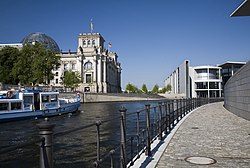
Back نهر شبريه Arabic نهر شبريه ARZ Şpree Azerbaijani شپری چایی AZB Шпрэе Byelorussian Шпрэе BE-X-OLD Шпрее Bulgarian Spree Breton Spree Catalan Spréva Czech
| Spree | |
|---|---|
 The Spree in Berlin, Reichstag building to the left | |
 | |
| Native name |
|
| Location | |
| Countries | |
| Cities | |
| Physical characteristics | |
| Source | |
| • location | Upper Lusatia |
| Mouth | Havel |
• location | Berlin-Spandau |
• coordinates | 52°32′10″N 13°12′31″E / 52.53611°N 13.20861°E |
| Length | about 400 km (250 mi) |
| Basin size | 10,105 km2 (3,902 sq mi) |
| Discharge | |
| • average | 36 m3/s (1,300 cu ft/s) |
| Basin features | |
| Progression | Havel→ Elbe→ North Sea |
 | |
The Spree (/ʃpreɪ, spreɪ/ S(H)PRAY, German: [ʃpʁeː] ⓘ; Sorbian languages: Sprjewja, Lower Sorbian: [ˈsprʲɛwʲa], Upper Sorbian: [ˈspʁʲɛwʲa]; Czech: Spréva [ˈsprɛːva]; in Lower Sorbian also called Rěka) is a river in Germany and the Czech Republic. With a length of approximately 400 kilometres (250 mi), it is the main tributary of the Havel River. The Spree is much longer than the Havel, which it flows into at Berlin-Spandau; the Havel then flows into the Elbe at Havelberg. The river rises in the Lusatian Highlands, in the Lusatian part of Saxony, where it has three sources: the historical one called Spreeborn in the village of Spreedorf, the water-richest one in Neugersdorf, and the highest elevated one in Eibau. The Spree then flows northwards through Upper and Lower Lusatia, where it crosses the border between Saxony and Brandenburg. After passing through Cottbus, it forms the Spree Forest (German: Spreewald), a large inland delta and biosphere reserve. It then flows through Lake Schwielochsee before entering Berlin, as Müggelspree (pronounced [ˈmʏɡl̩ˌʃpʁeː] ⓘ).
The Spree is the main river of Berlin, Brandenburg, Lusatia, and the settlement area of the Sorbs, who call the river Sprjewja; the name derives ultimately from Proto-Germanic *spreutaną "to spring forth". For a very short distance close to its sources, the Spree constitutes, as Spréva, the border between Germany and the Czech Republic. The Spree's longest tributaries are Dahme (confluence in Berlin-Köpenick) and Schwarzer Schöps (Čorny Šepc; confluence in Boxberg/O.L.-Sprey), other well-known tributaries (since they are Berlin rivers) are Panke and Wuhle.